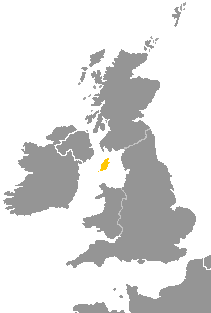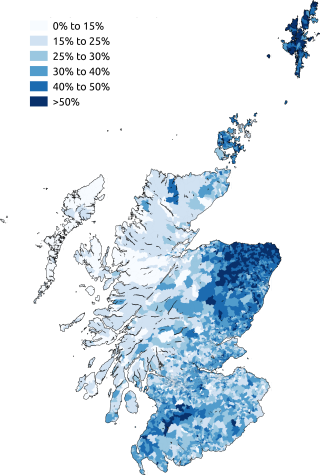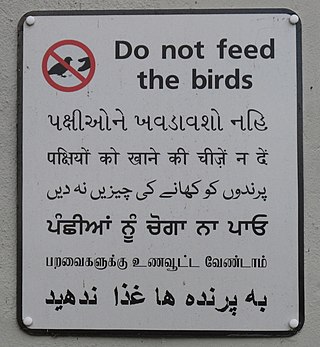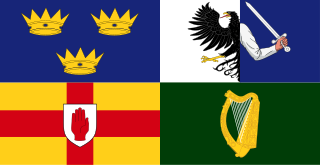British English is the set of varieties of the English language native to the United Kingdom. More narrowly, it can refer specifically to the English language in England, or, more broadly, to the collective dialects of English throughout the British Isles taken as a single umbrella variety, for instance additionally incorporating Scottish English, Welsh English, and Northern Irish English. Tom McArthur in the Oxford Guide to World English acknowledges that British English shares "all the ambiguities and tensions [with] the word 'British' and as a result can be used and interpreted in two ways, more broadly or more narrowly, within a range of blurring and ambiguity".
English usually refers to:
The Goidelic or Gaelic languages form one of the two groups of Insular Celtic languages, the other being the Brittonic languages.

Hiberno-English or Irish English (IrE), also formerly sometimes called Anglo-Irish, is the set of English dialects native to the island of Ireland.

Manx, also known as Manx Gaelic, is a Gaelic language of the insular Celtic branch of the Celtic language family, itself a branch of the Indo-European language family. Manx is the historical language of the Manx people.
Spoken English shows great variation across regions where it is the predominant language. The United Kingdom has a wide variety of accents, and no single "British accent" exists. This article provides an overview of the numerous identifiable variations in pronunciation. Such distinctions usually derive from the phonetic inventory of local dialects, as well as from broader differences in the Standard English of different primary-speaking populations.

Scots is an Anglic language variety in the West Germanic language family, spoken in Scotland and parts of Ulster in the north of Ireland. Most commonly spoken in the Scottish Lowlands, Northern Isles, and northern Ulster, it is sometimes called Lowland Scots to distinguish it from Scottish Gaelic, the Goidelic Celtic language that was historically restricted to most of the Scottish Highlands, the Hebrides, and Galloway after the sixteenth century; or Broad Scots to distinguish it from Scottish Standard English. Modern Scots is a sister language of Modern English, as the two diverged independently from the same source: Early Middle English (1150–1300).

The northern region of Europe has several definitions. A restrictive definition may describe Northern Europe as being roughly north of the southern coast of the Baltic Sea, which is about 54°N, or may be based on other geographical factors such as climate and ecology.

Ulster Scots or Ulster-Scots, also known as Ulster Scotch and Ullans, is the dialect of Scots spoken in parts of Ulster in Northern Ireland and the Republic of Ireland. It is generally considered a dialect or group of dialects of Scots, although groups such as the Ulster-Scots Language Society and Ulster-Scots Academy consider it a language in its own right, and the Ulster-Scots Agency and former Department of Culture, Arts and Leisure have used the term Ulster-Scots language.

English, in various dialects, is the most widely spoken language of the United Kingdom, but a number of regional and migrant languages are also spoken. Regional indigenous languages are Scots and Ulster Scots and the Celtic languages, Irish, Scottish Gaelic, Welsh and, as a revived language with few speakers, Cornish. British Sign Language is also used. There are also many languages spoken by immigrants who arrived recently to the United Kingdom, mainly within inner city areas; these languages are mainly from continental Europe and South Asia.
A regional language is a language spoken in a region of a sovereign state, whether it be a small area, a federated state or province or some wider area.

The English language in Europe, as a native language, is mainly spoken in the United Kingdom and Ireland. Outside of these states, it has official status in Malta, the Crown Dependencies, Gibraltar and the Sovereign Base Areas of Akrotiri and Dhekelia. In the Netherlands, English has an official status as a regional language on the isles of Saba and Sint Eustatius. In other parts of Europe, English is spoken mainly by those who have learnt it as a second language, but also, to a lesser extent, natively by some expatriates from some countries in the English-speaking world.
A national language is a language that has some connection—de facto or de jure—with a nation. There is little consistency in the use of this term. One or more languages spoken as first languages in the territory of a country may be referred to informally or designated in legislation as national languages of the country. National languages are mentioned in over 150 world constitutions.

Ulster English, also called Northern Hiberno-English or Northern Irish English, is the variety of English spoken in most of the Irish province of Ulster and throughout Northern Ireland. The dialect has been influenced by the Ulster Irish and Scots languages, the latter of which was brought over by Scottish settlers during the Plantation of Ulster and subsequent settlements throughout the 17th and 18th centuries.

The spoken English language in Northern England has been shaped by the region's history of settlement and migration, and today encompasses a group of related accents and dialects known as Northern England English (or, simply, Northern (English) in the United Kingdom).

There are a number of languages used in Ireland. Since the late 18th century, English has been the predominant first language, displacing Irish. A large minority claims some ability to use Irish, and it is the first language for a small percentage of the population.

The languages of Scotland belong predominantly to the Germanic and Celtic language families. The classification of the Pictish language was once controversial, but it is now generally considered a Celtic language. Today, the main language spoken in Scotland is English, while Scots and Scottish Gaelic are minority languages. The dialect of English spoken in Scotland is referred to as Scottish English.

Irish, or Gaelic, also sometimes known outside Ireland as Irish Gaelic, is a Goidelic language of the Insular Celtic branch of the Celtic language family, which is a part of the Indo-European language family. Irish is indigenous to the island of Ireland and was the population's first language until the 19th century, when English gradually became dominant, particularly in the last decades of the century. Today, Irish is still commonly spoken as a first language in areas of Ireland collectively known as the Gaeltacht, in which only 2% of Ireland's population lived in 2016. It is also spoken by a larger group of habitual but non-traditional speakers, mostly in urban areas where the majority are second-language speakers. From 2006 to 2008, over 22,000 Irish Americans reported speaking Irish as their first language at home, with several times that number claiming "some knowledge" of the language.

English is by far the most spoken, and the "de facto" national language of Northern Ireland,; it occurs in various forms, including Ulster English and Hiberno-English. Irish is an official language of Northern Ireland since 2022, and the local variety of Scots, known as Ulster Scots, has official minority status, with services in the language provided by public authorities. Northern Ireland Sign Language and Irish Sign Language have also been recognised with minority status since 29 March 2004.












